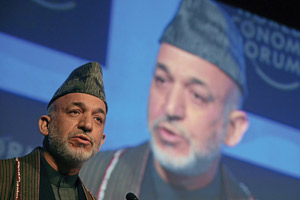A few days before departing Afghanistan for his meeting Wednesday in Washington with President Obama, Hamid Karzai announced the second of his two vice presidential picks: Mohammad Qasim Fahim, former leader of the militant group Jamiat-e-Islami. Fahim is a deeply controversial figure accused of numerous human rights violations during his time as a militia commander during the Afghan civil war. Human Rights Watch says that, by picking him, Karzai is “insulting the country.” In 2005, the group put out a report called “Blood-Stained Hands,” (.pdf) which found “credible and consistent evidence” that Jamiat-e-Islami had been involved in “widespread and systematic human rights abuses and violations of international humanitarian law.”
Fahim previously served as Afghanistan’s vice president in the years immediately following the 2001 US invasion, but was ousted by Karzai in 2004 in favor of Ahmad Zia Massood, brother of the slain Afghan commander Ahmad Shah Massood, assassinated by Al Qaeda just days before 9/11. Why the Afghan president has decided to resuscitate Fahim’s political career was among the questions I posed Wednesday to Karzai’s brother Mahmood, who spoke with me by phone from Afghanistan. He defended his brother’s VP choice, describing Fahim as a true Afghan patriot. Some edited excerpts from our conversation:
How do you respond to accusations that your brother has selected a warlord as his running mate?
I have heard some criticism of Marshal Fahim saying that he was a former warlord. Well, if the US really wants really top-notch, educated people in Afghanistan to run the country, then investments should have been made… these people should have been supported… In Afghanistan, when you attack somebody like Marshal Fahim as a warlord, it’s like saying in the Civil War in the United States that generals on both sides were warlords. You cannot say that. This guy was supported by the United States. It gave him plenty of funds to defeat the Taliban, and he did it.
To what extent was he selected for his tribal affiliation?He is from a Tajik tribe. You cannot have a Pashtun president and vice president, because the society is not ready for it. It would not accept it. Just like in Iraq we had a problem…. Mr. Karzai doesn’t have a political party. Marshal Fahim doesn’t either. Basically we are running this country on tribal affiliation, each with its proper role in politics according to its section of the society. In order to enter the modern age, modern institutions need to be established, and we have to work slowly in order to achieve that.
Couldn’t your brother have picked a less controversial Tajik politician?
My personal opinion is that Marshal Fahim, with the shortcomings that we have in Afghanistan because of the jihad and seven years of the Taliban and all that, is the most decent and stable. He is really in love with the country. I know him. Mr. Karzai fired him four years ago, and he stayed so calm and kept in the mind the national interest. It was always in his mind… He is a sensible man and was instrumental in defeating the Taliban. I hope that the West will give him some credit that he is a very prominent person in defeating the Taliban and forming this new country… We’ve never had such good representation of all the people taking into account all the tribal issues. The Hazaras are happy. The Tajiks are happy. The Pashtuns, who have always dominated the political scene in Afghanistan, are not so happy, but they’d better get used to it. This is not a monarchy anymore. This is a democracy. Everybody’s got their proper place, and we must work together to build this nation. The tribal issue might dissipate and become less important in time, but not now… In the current situation, Mr. Karzai picked the best choice, in my opinion, when he selected Marshal Fahim.












